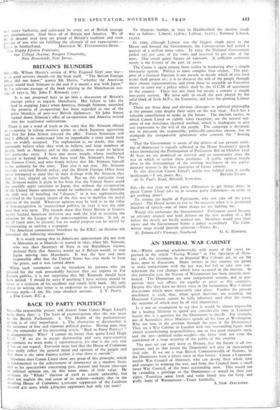BRITAIN'S BLUNDERS
SIR.-Mr. Wilson Harris's review of Why England Slept sent me— as all good reviews should—to the book itself. " The British Foreign Office did not know," quotes Mr. Harris, " whether the American people would back Stimson to the end if it meant a war with Japan." In the relevant passage of the book relating to the Manchurian out- rage of 1931-2, Mr. John F. Kennedy says:
It is not proposed here to go into a discussion of Britain's foreign policy as regards Manchuria. Her failure to take the lead in stopping Japan when America, through Stimson, extended the promise of co-operation has been regarded as one of the great blunders of post-war British diplomacy. Sir John Simon turned down Stimson's offer of co-operation and America retired into her traditional isolationism.
There is not a word of truth in the story that Mr. Stimson offered to co-operate in taking positive action to check Japanese aggression and that Sir John Simon rejected the offer. Future historians will find it difficult to understand how so improbable a story could have been so widely accepted. The explanation is, no doubt, that men commonly believe what they wish to believe, and large numbers of peop!e, both in America and in this country, were eager to believe this particular story. I have met many people, whose intellectual honesty is beyond doubt, who have read Mr. Stimson's book, The Far Eastern Crisis, and who firmly believe that Mr. Stimson himself is the authority for the story. That also is not true. Mr. Stimson severely criticised British policy, and the British Foreign Office have never attempted to deny that in their dealings with Mr. Stimson they had, in fact, slipped up rather badly. But on this particular issue Mr. Stimson makes it plain in his book that the United States could not possibly apply sanctions to Japan, that without the co-operation of the United States sanctions would be ineffective, and that therefore the only way of handling the " dispute," as it was euphemistically described in the League jargon of the day, was to mobilise the moral opinion of the world. Whatever opinion may be held as to the value of non-recognition in international politics, in 1932 it was the only road that was open. The records show that Great Britain at Geneva loyally backed American initiative and took the lead in securing the adoption by the League of the non-recognition doctrine. It led, as we all know now, to disaster, but no useful purpose can be served by recriminating or seeking a scapegoat.
The American commentary broadcast by the B.B.C. on October 6th contained the following statement:
It is worth noting that to Americans appeasement did not start in Abyssinia or at Munich—it started in 1931, when Mr. Stimson, who was then Secretary of State in our Republican regime, declared flatly that America would act if Britain would, to stop Japan moving into Manchuria. It was the best and most responsible offer that the United States has ever made to keep the peace, and it was turned down.
When such statements can be broadcast by persons who are selected for the task presumably because they are experts in Far Eastern politics, it is not surprising that Mr. Kennedy should have been misled. I should be sorry if anything I have written should be taken as a criticism of his excellent and timely little book. My only object in writing this letter is to endeavour to destroy a particularly
noxious myth.—I am, Sir, your obedient servant, J. T. PRATT. 4 Elm Court, B.C. 4.






































 Previous page
Previous page